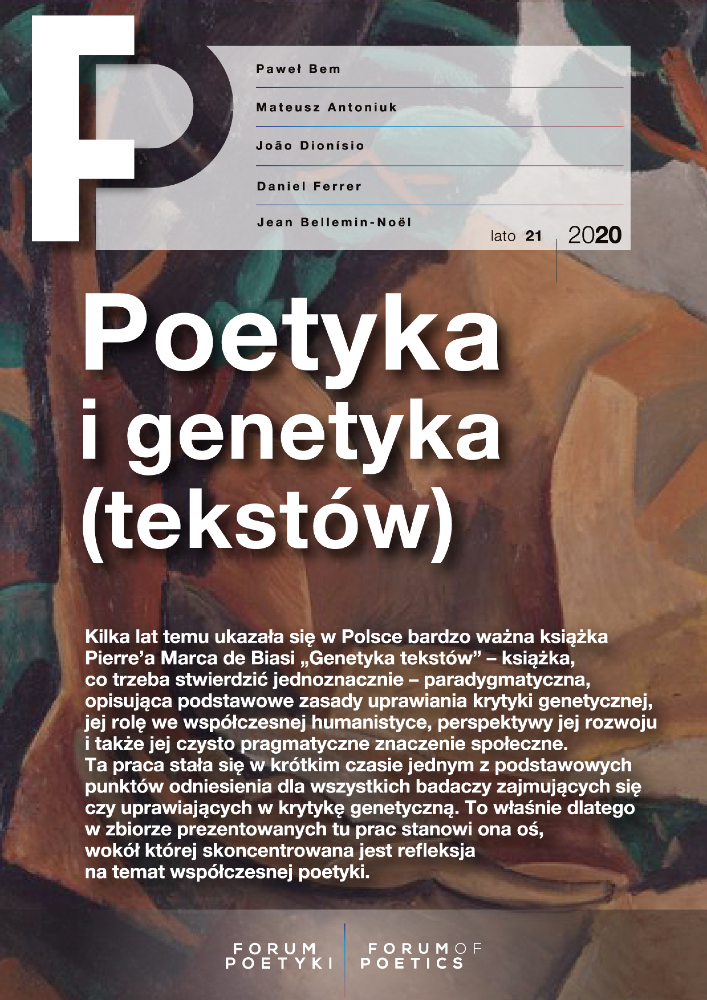Abstract
The article, inspired by Daniel Ferrer’s view of genetic variation as a process built of many interconnections, rather than a series of free operations subordinated to other operations, presents literary genesis as a game of variation. The rules of the game can only be tentatively discern by identifying its components from text and document. In the article, I devote special attention to the analysis of variations in absentia, i.e. a situation in which, although only one version of the text is written, it can be compared with a version that is closer to the reader (or more expected). Variation in absentia is essential for analyzing both textual and material aspects of the writing process (e.g. page layout changes, pen changes, replacing writing aids). In this article, I follow this kind of variation from the sketches of Os Degraus do Parnaso (The Steps to Parnas), a collection of essays by the versatile writer and analytical philosopher M.S. Lourenço (1936–2009). Accurate interpretation of textual and material constants and variables, in terms of spelling and the use of writing tools, leads to the conclusion that cases in the text (elements that, according to W.W. Greg, affect only formal presentation) are not always accidental in literary genesis.
References
Dionísio, João, Pimenta, Carlota. The Stages of Composition of Os Degraus do Parnaso, by M.S. Lourenço (w przygotowaniu).
Ferrer, Daniel. Logiques du brouillon. Modèles pour une critique génétique. Paris: Éditions du Seuil, 2011.
Fux, Johann Joseph. Gradus ad Parnassum. Texte original intégral. Wprowadzenie, tłumaczenie i przypisy przez JeanPhilippe Navarre. Sprimont: Pierre Mardaga, 2000.
Fux, Johann Joseph. The study of counterpoint [z J.J. Fux’s Gradus ad Parnassum]. Wydanie poprawione. Przetłumaczone przez Alfred Mann ze współpracą John Edmunds. New York, London: W.W. Norton & Company, 1971.
Grésillon, Almuth. Éléments de critique génétique. Lire les manuscrits modernes. Paris: PUF, 2016 [1994].
Grésillon, Almuth. „Les variantes de manuscrits: critères et degrés de pertinence”. W La publication des manuscrits inédits. Zredagowane przez Louis Hay i Winfried Woesler, 179189. Berne: Peter Lang, 1979.
Grésillon, Almuth. Lebrave, JeanLouis. „Linguistique et génétique des textes: un décalogue”, 3749. W Le français moderne: numéro special. Tendances actuelles de la linguistique française. Paris: CILF, 2008, https://tinyurl.com/y2ebqgmt (dostęp: 15.06.2020).
Lourenço, Frederico. Pode um desejo imenso. Lisboa: Cotovia, 2002.
Lourenço, M. S. „Before the Barbarians”. W A Revisionary History of Portuguese Literature. Zredagowany przez Miguel Tamen i Helena C. Buescu, 124141. New York, London: Garland, 1999.
Lourenço, M. „Brennende Schlaflosigkeit in Innsbruck”. Przetłumaczone przez Erwin Koller. Literatur und Kritik 353354 (2001): 6468.
Lourenço, M. Harmonielehre | III | Skizzen. (Notatnik z prywatnej kolekcji). 19831989.
Lourenço, M. Modelos mecânicos na filosofia da consciência, „Crítica. Revista do Pensamento Contemporâneo. Wittgenstein, a linguagem e a filosofia”, nr 6 (1991), 4980.
Lourenço, M. Notizbuch | Ab | Sommersemester 1984. (Notatnik z prywatnej kolekcji). 19841989.
Lourenço, M. O Caminho dos Pisões. Lisboa: Assírio & Alvim, 2009.
Lourenço, M. Rubryka „Os Degraus do Parnaso”. O Independente, 1989.
Lourenço, M. Os Degraus do Parnaso. Lisboa: O Independente, 1991.
Lourenço, M. Os Degraus do Parnaso. Lisboa: Assírio & Alvim, 2002.
Tydeman, William, Price, Steven. Wilde. Salome. Cambridge: Cambridge University Press, 1996.
West, Martin L. Textual Criticism and Editorial Technique Applicable to Greek and Latin texts. Stuttgart: Teubner, 1973.
Wittgenstein, Ludwig. Dociekania filozoficzne. Przełożył, wstępem poprzedził i przypisami opatrzył Bogusław Wolniewicz. Warszawa: Wydawnictwo Naukowe PWN, 2000.
License
Authors of articles are responsible for securing the rights to other publications (texts, tables, drawings and other illustrations) quoted or reproduced in their texts.

